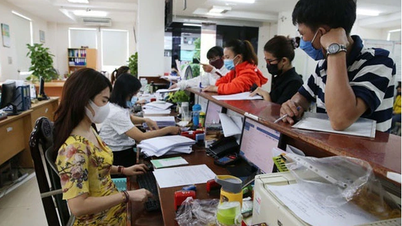
The Vietnamese real estate market will face difficulties if the US imposes high tariffs on Vietnamese goods while the industry's difficulties have not yet recovered - Photo: NGOC HIEN
Vietnam's real estate market faces difficulties as the US imposes a 46% tax on goods, affecting FDI flows and investment sentiment.
Speaking with Tuoi Tre Online on the morning of April 3, businesses in the real estate and industrial park infrastructure sectors all predicted that the real estate market in general, especially the industrial real estate market, will face difficulties if the 46% corresponding tax is implemented on April 9.
The leader of an industrial infrastructure enterprise said that recently, many enterprises have stepped up investment in many green industrial parks with high investment costs, with the expectation of attracting FDI capital flows to shift to Vietnam.
Among the main export markets of FDI enterprises, the US is still one of the key markets. These tariff policies will have a major impact on capital flows, investor sentiment and production plans of enterprises operating in Vietnam.
Meanwhile, Mr. Dinh Minh Tuan, Southern region director of Batdongsan (a member of Property Guru Group), said that if this very high tax rate is implemented, Vietnam may experience a decrease in FDI capital flows, causing difficulties for industrial and residential real estate.
According to Mr. Tuan, if multinational corporations reduce or postpone factory expansion plans, demand for land, factory space and industrial park rental prices may decrease, causing inventory to increase and new industrial parks to be delayed.
This will affect areas that are currently the “stars” of industrial real estate development such as Bac Ninh, Bac Giang, Hai Phong, Long An, Binh Duong, etc.
In addition, Mr. Tuan said that the liquidity of the real estate market in the mid-range and low-end segments may decrease when the labor force from export enterprises is affected by production cuts, working hours cuts, and income reductions, affecting people's ability to buy houses.
Mr. Tuan also pointed out the risk that the demand for buying/renting houses by foreigners will decrease as foreigners (mainly from Korea, Japan, China) often buy high-end real estate or invest in Vietnam thanks to the growth of FDI and industrial parks.
“When FDI decreases, the number of foreign experts working in Vietnam decreases, leading to a decrease in demand for renting and buying high-end houses,” Mr. Tuan commented.
In addition, Mr. Tuan commented that under pressure to control inflation and exchange rates, home buyers will have difficulty repaying their debts, leading to a decrease in new purchasing power, especially in the mid-range segment.
“The negative sentiment from the 46% tariff has also caused the real estate market to fall into a temporary “wait and see” and “freeze” state. The severity will depend on Vietnam’s ability to respond and developments in global trade policy in the coming time,” said Mr. Tuan.
Which real estate segments will be affected if the US imposes a 46% tax?
Mr. Tuan commented that the real estate segments that will be greatly affected are mid-range real estate, industrial real estate and possibly resorts.
Besides, high-end real estate may be less affected because customers are the group that is less affected by short-term fluctuations and then there may be the land group when prices are still low and mainly buy waiting for price increases.
Source: https://tuoitre.vn/thi-truong-bat-dong-san-viet-lo-gap-kho-khi-my-ap-thue-46-20250403120345618.htm





![[Photo] Vietnam shines at Paris International Fair 2025 with cultural and culinary colors](https://vphoto.vietnam.vn/thumb/1200x675/vietnam/resource/IMAGE/2025/5/4/74b16c2a197a42eb97597414009d4eb8)





















































































![[Video]. Building OCOP products based on local strengths](https://vphoto.vietnam.vn/thumb/402x226/vietnam/resource/IMAGE/2025/5/3/61677e8b3a364110b271e7b15ed91b3f)



Comment (0)